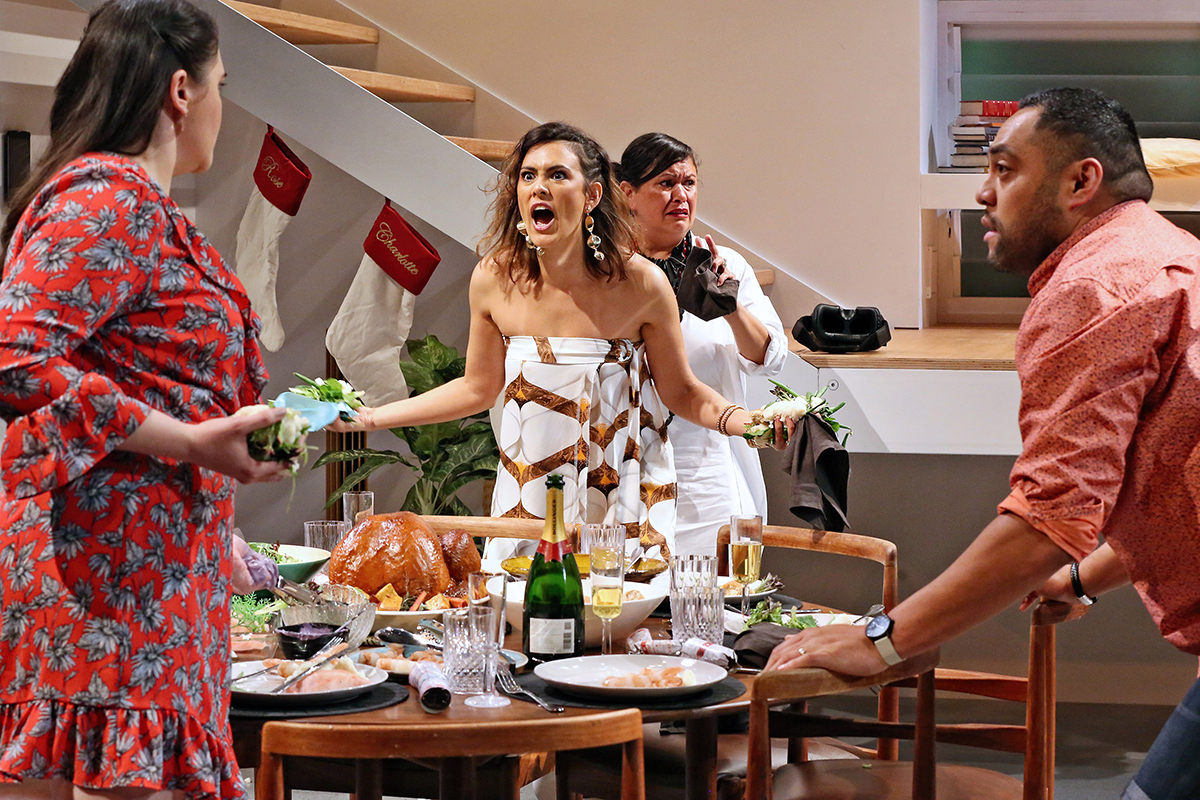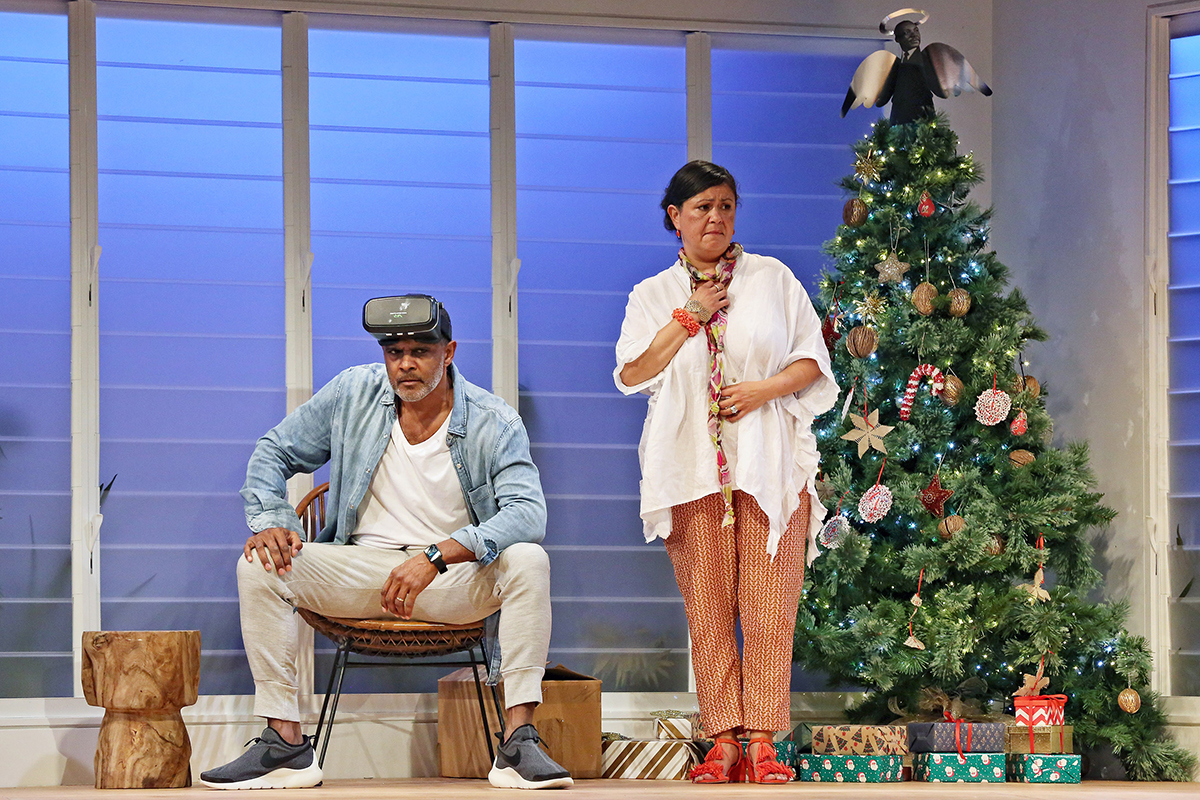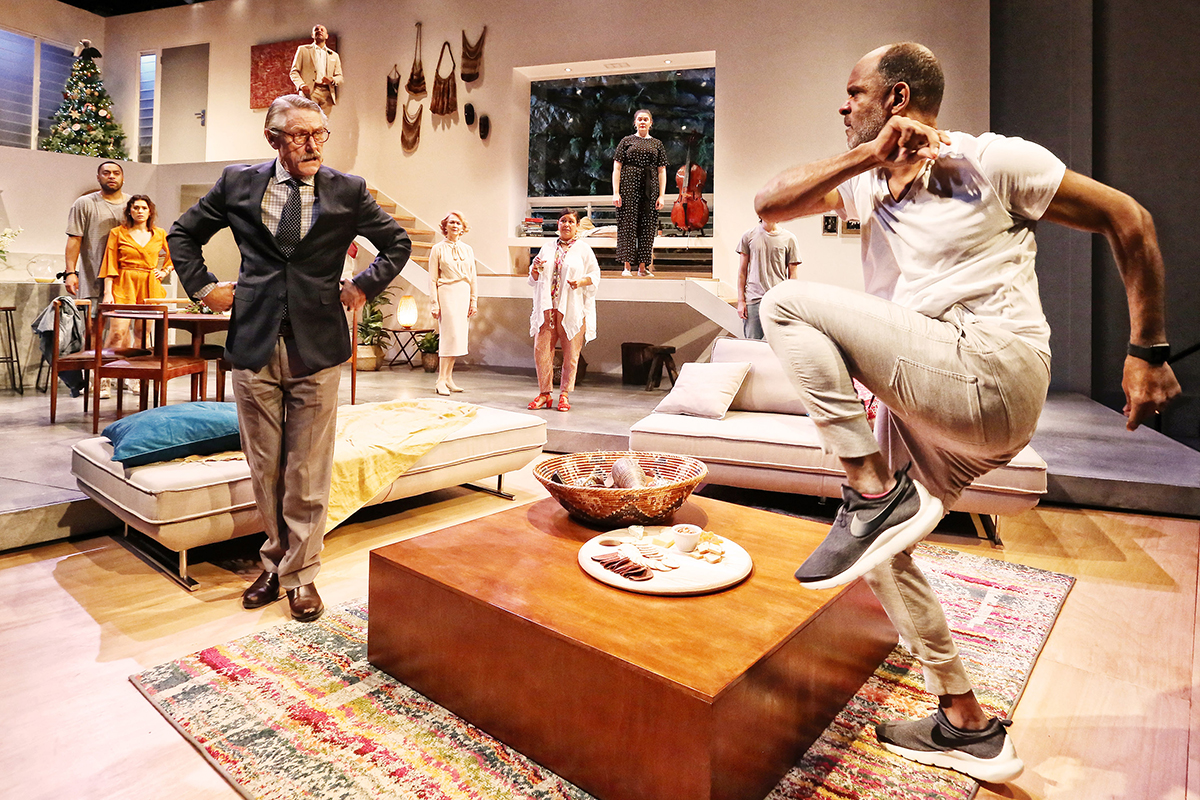Nakkiah Lui has appropriated — or been appropriated by — the bourgeois comedy of manners. Tellingly, she doesn’t satirise the form, though now and then tips it into riotous farce, but uniquely centres Black is the New White on a well-to-do Aboriginal middle class family who come to acknowledge that, like their white peers, they can be oppressors of fellow Indigenous Australians and, when it comes to arguing over the black/white divide, they are sometimes their own and each other’s worst enemies. On the surface, Black is the New White is wickedly funny, infused with Aboriginal humour — blunt, droll, barbed — and, for a middle class family, not at all genteel. Its subjects are anxieties about self, love, community, gender and politics, joked about but indicative of a deeper unifying concern about race. That’s not surprising, even for a family like this at a remove from the grimmer aspects of Aboriginal life in Australia. Their insistent joking is more than communal fun; it’s a political weapon and a collective defence mechanism.
For a white Australian audience, Black is the New White offers potential insights into a class of people rarely portrayed on stage or screen, though increasingly in evidence in the professional characters in Redfern Now (2012-13) and scattered roles in a number of Aboriginal plays and television productions. Ray (Tony Briggs), the father in this family and a community leader, fancies himself as an Aboriginal Martin Luther King, wastes time debating the qualities of lettuce types on Twitter, plays golf, objects to his daughter’s relationship with an unemployed white experimental cellist and, when frustrated, hides in a virtual reality helmet (not turned on). And he’s doggedly racist. It’s beyond him to shake the hand of or offer a drink to the inadvertently naked, feckless Francis (James Bell), the boyfriend of his daughter Charlotte (Shari Sebbens). Ray growls, “How dare you be nude and white in my house.”

Cast of Black is the New White, Sydney Theatre Company, photo © Prudence Upton
The restless gravitational centre of Black is the New White is Charlotte’s challenge to her father: that he acknowledge his isolation from his community, that his wealth is disproportionate and that he let through a clause in a Land Rights case that severely disadvantaged his people. This manifests as a furious outburst in the second act but we witness its gradual escalation in the first. Though successful in cases against mining companies in court, Charlotte nonetheless feels out of her depth and is determined to do an advanced degree in New York, to learn how to change the law, not merely exercise it. Ray thinks that Charlotte should take up his activist legacy, doggedly insisting that she not go to New York, but instead accept a TV offer and become “a black female Waleed Aly.”
In Shari Sebbens’ finely nuanced performance we watch the affectionate Charlotte grow increasingly frustrated, attempting to maintain a smile and lay claim to love, honesty and her own place in the world as her father and sister Rose bluntly lay out their opposition to her relationship with Francis. A successful LA-based designer, Rose (Kylie Bracknell [Kaarljilba Kaardn]) is hostile to the diluting of black blood with white — it’s genocide, she claims, citing a 74% Indigenous marriage rate with whites.

Tony Briggs, Melodie Reynolds-Diarra, Black is the New White, Sydney Theatre Company, photo © Prudence Upton
Eruptions of confrontation aside, Lui wraps her play like a Christmas present with perpetual joking, amusing political jibes, Francis’ gaffes, communal hilarity (including song and dance), the playful sexuality of the black couples, and the presence of a “Spirit of Christmas” narrator (Luke Carroll) who, novelist-like, fills in back stories while remaining unseen by his subjects. (It’s a limited, thinly integrated role, though played with verve it aptly compounds a sense of the play as fable.)
Black is the New White could conceivably have been built entirely around a black family and a lone white guest, but Lui ramps up the tension and the fun with the eventual arrival of Francis’ parents. Dennison Smith (Geoff Morrell) is a former 1990s right wing conservative parliamentarian and Ray’s political enemy. Lui briskly reveals a man who cannot express love for the son he is determined to push into work by cutting off his allowance, or for his seemingly dotty wife, Marie (Vanessa Downing), whose loneliness and sexual starvation have propelled her into erotic discovery. The revelation is sadly funny in Marie’s telling and Morrell conveys its impact with palpable anguish and physical collapse.
Lui’s sense of humour and the performers’ engagement with it never obscure depth of feeling, although at the end of the play the sheer scale of change, resolution and conciliation, as so often in classic comedy, can only be sketched. Thwarted lovers Charlotte and Francis are reunited by their now bonded fathers (“Yes, a treaty!”). There is forgiveness, faults are admitted, humility attained and, above all, as Joan (whose considerable role in his successful career is admitted by Ray) argues, the preoccupation with difference between black and white must not be obsessed over. (That theme hits home most palpably with regard to the identity of Rose’s husband, Sonny [Anthony Taufa], ex-champion Aboriginal footballer, role model and banker, when he has a DNA test for an appearance on Celebrity Who Do You Think You Are?)

Cast of Black is the New White, Sydney Theatre Company, photo © Prudence Upton
Nakkiah Lui’s considerable achievement is to have created a propulsive comedy rich in jokes, pointed ironies and serious commentary that simultaneously spring from the lives of the play’s characters, each of whom is deftly portrayed in word and performance, their souls bared and pain felt. Director Paige Rattray and an admirable cast do great justice to Lui’s play.
The production’s brisk pace allows a stream of politically incorrect utterances (from both sides of the fence) and painfully incisive remarks to fly by, many likely forgotten if cumulatively conjuring a nervy cultural and political context. Perhaps the sheer number of themes lightens the play’s focus, leaving behind a warm ‘she’ll be right’ aura, the kind of coziness often associated with bourgeois comedy. But as Lui has expressly stated, she didn’t want this to be another play about death and depredation, and her play introduces a new world to its white audiences and doubtless Aboriginal ones too. Will Lui, an experimenter to date, be “appropriated” by the comedy of manners after her play’s great success and write more in the same vein, or is she honing her craft and enlarging its range and potential?
It’ll be fascinating to learn what Aboriginal audiences make of Black is the New White if the play gains a wider reach, let alone the likes of Andrew Bolt and the much put-upon David Leyonhjelm — would it be a simple-minded, “Black racism; I told you so”? A favourite line in the play asserts that blacks are not passive-aggressive, it’s a white thing; that got a confirming laugh.
–
Sydney Theatre Company: Black is the New White, writer Nakkiah Lui, director Paige Rattray, performers James Bell, Kylie Bracknell [Kaarljilba Kaardn], Tony Briggs, Luke Carroll, Vanessa Downing, Geoff Morrell, Melodie Reynolds-Diarra, Shari Sebbens, Anthony Taufa, designer Renée Mulder, lighting designer Ben Hughes, composer, sound designer Steve Toulmin; Wharf 1, Sydney, 5 May-17 June
Top image credit: James Bell, Shari Sebbens, Black is the New White, Sydney Theatre Company, photo © Prudence Upton



